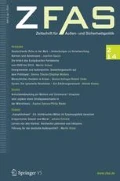Zusammenfassung
Ausgehend von der Beobachtung zunehmender grenzüberschreitender Interdependenzen zwischen Gesellschaften, von Problemzusammenhängen und Politikfeldern führt der Aufsatz den Begriff des globalen Gemeinwohls als normativen und analytischen Rahmen für Entwicklungsforschung und -politik sowie Zusammenarbeit für globale Nachhaltigkeit im 21. Jahrhundert ein. Er rekurriert auf die Konzepte des Gemeinwohls, der nachhaltigen Entwicklung und der Gemeinschaftsgüter, um die Verbundenheit von globalem und nationalem Gemeinwohl zu erfassen und die Orientierung am globalen Gemeinwohl als Fluchtpunkt internationaler Kooperation in einer immer enger vernetzten Weltgesellschaft zu begründen.
Abstract
Based on the observation of increasing cross-border interdependencies between societies, problem constellations and policy fields, the article introduces the concept of the global common good as a normative and analytical framework for development research and policy and international cooperation for global sustainability in the 21st century. It recurs to the concepts of the common good, sustainable development and public goods in order to grasp the linkages between global and national welfare, and to justify why the search for the global common good should guide international cooperation for sustainable development in an ever more interlinked world society.
Notes
Im vorliegenden Artikel wird, abweichend vom ZfAS-Standard, bei personenbezogenen Substantiven die männliche grammatikalische Form verwendet. Die Autorin bzw. der Autor schließt damit Personen weiblichen wie männlichen Geschlechts gleichermaßen ein.
Gemeint ist die Region im Nahen Osten und Nordafrika (Middle East and North Africa).
Literatur
Barry, B. (1997). Sustainability and intergenerational justice. Theoria, 44(89), 43–64.
Blum, C. (2013). Eine integrative Theorie des Gemeinwohls. Politische Vierteljahresschrift, 54(4), 662–685.
Chapin, F. S., Power, M. E., Pickett, S. T. A., Freitag, A., Reynolds, J. A., Jackson, R. B., Lodge, D. B., Duke, C., Collins, S. L., Power, A. G., & Bartuska, A. (2011). Earth stewardship: Science for action to sustain the human-earth system. Ecosphere, 2(8), 1–20.
Fraenkel, E. (1964). Deutschland und die westlichen Demokratien. Baden-Baden: Nomos.
Hale, T., & Held, D. (Hrsg.). (2017). Beyond gridlock. Oxford: Polity.
Haraway, D. (2016). Staying with the trouble: Making kin in the chthulucene. Durham: Duke University Press.
Kavalski, E. (Hrsg.). (2015). World politics at the edge of chaos: Reflections on complexity and global life. Albany: SUNY.
Kennedy, P., Messner, M., & Nuscheler, F. (2001). Global trends and global governance. London: Pluto.
Klingebiel, S., Messner, D., & Scholz, I. (2017). Entwicklungspolitische Eckpunkte in turbulenten Zeiten – Anmerkungen im Wahljahr. Zeitschrift für Außen- und Sicherheitspolitik, 10(2), 179–190.
Kremendahl, H. (1977). Pluralismustheorie in Deutschland. Entstehung, Kritik, Perspektiven. Leverkusen: Heggen.
Leggewie, C. (2017). Europa zuerst! Eine Unabhängigkeitserklärung. Berlin: Ullstein.
Messner, D. (2015). A social contract for low carbon and sustainable development: Reflections on non-linear dynamics of social realignments and technological innovations in transformation processes. Technological Forecasting and Social Change, 98(9), 260–270.
Messner, D., & Weinlich, S. (Hrsg.). (2016). Global cooperation and the human factor in international relations. London: Routledge.
Münkler, H. (2010). Gemeinwohl als Aufgabe von Politik und als Reflexionsbegriff der Wissenschaft. In H. Dreier, & D. Willoweit (Hrsg.), Wissenschaft und Politik (S. 245–259). Stuttgart: Franz Steiner.
Münkler, H., & Bluhm, H. (Hrsg.). (2001). Gemeinsinn und Gemeinwohl. Historische Semantik politischer Leitbegriffe. Berlin: Akademie Verlag.
Nye, J. S., & Donahue, J. D. (2000). Governance in a globalizing world. Washington: Brookings.
Rawls, J. (1999). A theory of justice (revised edition). Cambridge: Belknap.
Reinicke, W. (1998). Global public policy: Governing without government? Washington: Brookings.
Sand, P. H. (2004). Sovereignty bounded: Public trusteeship for common pool resources? Global Environmental Politics, 4(1), 47–71.
Schmitt-Egner, P. (2015). Gemeinwohl. Konzeptionelle Grundlinien zur Legitimität und Zielsetzung von Politik im 21. Jahrhundert. Baden-Baden: Nomos.
Stafford-Smith, M., Griggs, D., Gaffney, O., Ullah, F., Reyers, B., Kanie, N., Stigson, B., Shrivastava, P., Leach, M., & O’Connell, D. (2017). Integration: The key to implementing the sustainable development goals. Sustainability Science, 12(6), 911–919.
Steffani, W. (1979). Parlamentarische und präsidentielle Demokratie: Strukturelle Aspekte Westlicher Demokratien. Opladen: VS.
Tirole, J. (2017). Economics for the common good. New Jersey: Princeton University Press.
Tomasello, M. (2009). Why we cooperate. Boston: Boston Review Books.
Waltz, K. (1979). Theory of international politics. New York City: Random House.
WBGU – Wissenschaftlicher Beirat der Bundesregierung Globale Umweltveränderungen. (2009). Kassensturz für den Weltklimavertrag – Der Budgetansatz (Sondergutachten). Berlin: WBGU.
WBGU. (2013). Welt im Wandel: Menschheitserbe Meer (Hauptgutachten). Berlin: WBGU.
WBGU. (2014). Klimaschutz als Weltbürgerbewegung (Sondergutachten). Berlin: WBGU.
Weidner, H. (2002). Gemeinwohl und Nachhaltigkeit – Ein prekäres Verhältnis. Wissenschaftszentrum Berlin für Sozialforschung. Discussion Paper, FS II 02-303.
Weiss, E. (1990). Our rights and obligations to future generations for the environment. American Journal of International Law, 84(1), 198–207.
Author information
Authors and Affiliations
Corresponding author
Rights and permissions
About this article
Cite this article
Messner, D., Scholz, I. Globale Gemeinwohlorientierung als Fluchtpunkt internationaler Kooperation für nachhaltige Entwicklung – Ein Perspektivwechsel. Z Außen Sicherheitspolit 11, 561–572 (2018). https://doi.org/10.1007/s12399-018-0734-5
Published:
Issue Date:
DOI: https://doi.org/10.1007/s12399-018-0734-5

